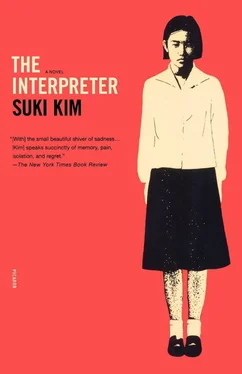Suki Kim - The Interpreter
Здесь есть возможность читать онлайн «Suki Kim - The Interpreter» весь текст электронной книги совершенно бесплатно (целиком полную версию без сокращений). В некоторых случаях можно слушать аудио, скачать через торрент в формате fb2 и присутствует краткое содержание. Город: New York, Год выпуска: 2011, ISBN: 2011, Издательство: Picador, Жанр: Детектив, Триллер, на английском языке. Описание произведения, (предисловие) а так же отзывы посетителей доступны на портале библиотеки ЛибКат.
- Название:The Interpreter
- Автор:
- Издательство:Picador
- Жанр:
- Год:2011
- Город:New York
- ISBN:0-312-42224-5
- Рейтинг книги:3 / 5. Голосов: 1
-
Избранное:Добавить в избранное
- Отзывы:
-
Ваша оценка:
- 60
- 1
- 2
- 3
- 4
- 5
The Interpreter: краткое содержание, описание и аннотация
Предлагаем к чтению аннотацию, описание, краткое содержание или предисловие (зависит от того, что написал сам автор книги «The Interpreter»). Если вы не нашли необходимую информацию о книге — напишите в комментариях, мы постараемся отыскать её.
The Interpreter — читать онлайн бесплатно полную книгу (весь текст) целиком
Ниже представлен текст книги, разбитый по страницам. Система сохранения места последней прочитанной страницы, позволяет с удобством читать онлайн бесплатно книгу «The Interpreter», без необходимости каждый раз заново искать на чём Вы остановились. Поставьте закладку, и сможете в любой момент перейти на страницу, на которой закончили чтение.
Интервал:
Закладка:
“Nabokov… If he hated America so much, does that mean that he loved Russia?” Suzy is fingering the pack of cigarettes in her coat pocket, but this is not a cigarette moment. That would be too close to home. A late-afternoon park in November. A cup of coffee. Jen sitting by her side.
“I don’t believe he did. I don’t believe he was capable of that kind of love or hate for a country. He was too selfish. You can see that in his writing. He picked each word as though his entire life was at stake. He was notorious for jotting down every thought on three-by-five index cards. His life was a string of exile, from England to Germany to France to America to Switzerland. It was right after renouncing Russian that he threw this verbal masturbation of a novel called Lolita at the American public. Here’s this Russian guy who’s only been living in the U.S. for a decade or so, tripping on English prose like Faulkner on acid! What’s worse, just as the American readers can’t get enough of him, he skips out to Switzerland. The reason? His obsession with butterflies. Of course he was strange, no doubt about it. But I think Harrison is wrong. Russia versus America would’ve been too simple for Nabokov. If he’d been tortured, which I believe he was, then it was about something less obvious. The Cold War might have contributed, but his oddness, that something which doesn’t quite add up about him, goes way deeper. No, I’m not talking about the sexual perversity of his book, which is hardly relevant, but something else, the neatness, the systematic design of his life, like those index cards. Did you know that he lived exactly twenty years on each continent? Twenty years in Russia, twenty in Western Europe, twenty in America, before his final attempt in the neutral Switzerland, where he ended up dying in his seventeenth year? If he had lived, would he have moved again once he filled his twenty-year quota? Where would he have gone?”
Suzy is hardly listening anymore. Too selfish for exile . Was there a bigger reason behind her parents’ constant moving? Or had they always been fleeing from one situation to another? Were they skipping out on unpaid rent? Why did they leave Korea?
Once, when Suzy was either seven or eight, she was awoken in the middle of the night. “Get dressed,” Mom whispered, shoving the clothes and books into big black garbage bags. Both Suzy and Grace stumbled out of bed and threw on whatever they found, grabbing their favorite dolls before following Mom out. Dad was waiting outside in his dove-gray Oldsmobile. When they stole into the night, both Suzy and Grace fell asleep, only to wake up a few hours later at a roadside motel along Route 4, off the New Jersey Turnpike. The family stayed in a tiny linoleum-floored room for about a week before moving into the studio apartment in Jersey City. Her parents never talked about it afterward, but the silence of the night road stuck with Suzy. The hurried steps of Mom gathering things in their old apartment; the clammed-up face of Dad behind the wheel. Before Suzy fell asleep in the back seat, she remembers, Mom turned around a few times to look through the rear window. Suzy wanted to look as well, but she felt too sleepy and afraid.
Strangely enough, the weeklong stay at the motel was not so bad. Neither Suzy nor Grace minded much. It didn’t happen every day that they could skip school with their parents’ permission. It was almost fun to be stranded in a strange room with all their belongings stuffed in bundles. It felt like playing house, to search through the bags for toothbrushes and a matching sock. They amused themselves with whatever they found curious in that motel room. There was an airbrushed painting of Jesus Christ hanging above one of the beds, which Suzy and Grace tried to copy onto a piece of paper. Neither could draw, and their finished sketch revealed a scary-looking, bearded old man. Suzy remembers the drawing vividly, because it belonged to one of the rare moments when Grace laughed with her, when they had no school, no house chores, no Korean-language lesson. Both Mom and Dad would set off each morning, presumably to look for housing and work, leaving them with a bag of food, mostly from the fast-food counters along the highway, a couple of burgers, a bag of potato chips, and a family-sized Coke. It was a treat. McDonald’s every day, like eating out for each meal. Grace still ate things like that then. Only later, when she started high school, did she become obsessed with dieting.
Fat was not what concerned Grace, not the way it did other girls. She simply cut out things that she considered extra. No chili-pepper paste, because it contained sugar, which ruled out practically all Korean food except white rice and a few odd dishes. No oil of any kind, which Mom used generously in cooking. No soy sauce, because its black color looked artificial. It did not matter whether the dish contained meat or fish or vegetables as long as it was steamed, poached, or broiled, seasoned only with salt. Grace would blame it on an allergic reaction as she sat picking at a bowl of white rice and not much else. Dad called Grace crazy. Did she realize what he had to do to get that food on the table? Once, he tried to force-feed her a plate of fried dumplings. He sat before her and ordered her to eat. When Grace would not budge, he forced her mouth open and stuffed the dumplings in one by one. Mom sat at the end of the table and did not say a word; Suzy began to cry. Neither intervened, partly because they were afraid to disobey him, and partly because they were both secretly relieved. Grace’s food problem had become increasingly noticeable. It seemed to harbor a certain brooding anger, which then manifested into an overwhelming tension around the dinner table. Her silent rebellion broke the code of whatever had held the family together. By rejecting the food they all shared, Grace was declaring herself separate, apart. It was impossible to ignore the weight, the terrible mood of discord that would be cast over the family each time Grace pushed the food away with her chopsticks. As they watched, Grace vomited every mushy bit of meat and dough onto the floor. Finally, Dad slapped her once and stormed out. After that, he never commented on Grace’s eating habit. They all learned just to ignore it. That might have been the beginning of their silent dinners.
With each year, Grace became more and more withdrawn from the rest of the family. There was a certain anger Suzy sensed, but nothing palpable enough to put a finger on. The only thing she knew was that if Grace had had a choice she would not have wanted to be her sister, or, more clearly, her parents’ daughter, and it was this realization that always came between the sisters. The coldness, or the unassailable distance between them, was in fact a clear desire for separation.
But why, even now, even years later, Suzy cannot say.
“Sorry, I got carried away. Maybe you’re right. I could turn forty and still be obsessing over dead writers.” Jen is getting up. It is now past five o’clock. The fax from Harrison might be waiting for her. The day is far from over.
“Thanksgiving. I guess it’s Thanksgiving soon.” Suzy suddenly recalls the holiday with Damian. He did not believe in it, she knew. He hated holidays. But he seemed to derive a certain oblique pleasure from celebrating this particular American tradition with her, as though he were maneuvering a young woman onto a sordid path. He claimed it an éducation sentimentale in the American way. He would fuss over each stage of preparation. The ten-pound turkey that was too big for the two of them, the bread stuffing baked with yellow raisins and macadamia nuts, the cranberry sauce simmered for exactly half an hour, the pumpkin pie he had preordered from Balducci’s because he did not bake. He loved watching her eat. He himself hardly touched the food. “Dreadful memories,” he said. “You cannot imagine the atrocity of the Midwestern Thanksgiving. Everyone gorges on the feast, because there’s nothing else to do. No one has anything to say, because overeating does that to a mind. Remember, it’s the core of the American culture, the barest of food, the big slab of what barely qualifies as a bird.” No one was more cynical about America than Damian, which must have been why he became fascinated with Asian art. But did it mean that he loved Asia? He cannot love an Asian woman , Professor Tamiko had warned her. Yet it took the death of her parents for Suzy to leave him.
Читать дальшеИнтервал:
Закладка:
Похожие книги на «The Interpreter»
Представляем Вашему вниманию похожие книги на «The Interpreter» списком для выбора. Мы отобрали схожую по названию и смыслу литературу в надежде предоставить читателям больше вариантов отыскать новые, интересные, ещё непрочитанные произведения.
Обсуждение, отзывы о книге «The Interpreter» и просто собственные мнения читателей. Оставьте ваши комментарии, напишите, что Вы думаете о произведении, его смысле или главных героях. Укажите что конкретно понравилось, а что нет, и почему Вы так считаете.












